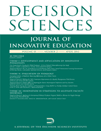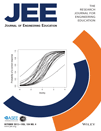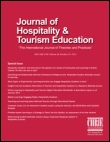
Journal of Civil Engineering Education
Scope & Guideline
Elevating Standards in Engineering Education
Introduction
Aims and Scopes
- Innovative Educational Practices:
The journal emphasizes novel teaching methodologies, such as gamification, project-based learning, and the use of technology in the classroom, to enhance student engagement and learning outcomes. - Interdisciplinary Approaches:
It promotes cross-disciplinary collaboration, integrating insights from various fields like social sciences and ethics into civil engineering education. - Competency Development:
The focus is on developing essential competencies among students, including technical skills, leadership, and social awareness, to prepare them for the evolving demands of the industry. - Sustainability and Ethics in Engineering:
The journal highlights the importance of sustainability and ethical considerations in civil engineering education, reflecting the growing awareness of these issues in the profession. - Data-Driven Insights:
Research utilizing data analytics and machine learning to assess educational practices and student performance is a key area, contributing to evidence-based improvements in curricula.
Trending and Emerging
- Gamification and Interactive Learning:
There is a strong trend towards incorporating gamification and interactive learning experiences to enhance student engagement and motivation in civil engineering education. - Technology-Enhanced Learning Environments:
The integration of advanced technologies, including augmented reality (AR) and virtual reality (VR), is gaining momentum, providing immersive learning experiences that bridge theory and practice. - Focus on Social Justice and Ethics:
An emerging emphasis on social justice and ethical considerations in engineering education is evident, highlighting the need for engineers to understand the societal impacts of their work. - Cross-Disciplinary Learning:
Research exploring cross-disciplinary approaches, particularly in the context of integrating social sciences and humanities into engineering curricula, is becoming increasingly relevant. - Student-Centered Learning and Self-Directed Learning:
There is a growing focus on fostering self-directed learning and student agency, preparing students to take ownership of their educational journeys and adapt to future challenges.
Declining or Waning
- Traditional Lecture-Based Methods:
There is a noticeable decline in research focused on conventional lecture-based teaching methods, as the journal increasingly favors interactive and student-centered approaches. - Narrow Technical Skill Focus:
Papers centered solely on technical skills without integrating broader competencies or ethical considerations are appearing less frequently, reflecting a shift towards holistic engineering education. - Static Assessment Methods:
The use of traditional assessment methods, such as standardized testing, is decreasing in favor of more dynamic and formative assessment approaches that align with modern educational practices.
Similar Journals

Decision Sciences-Journal of Innovative Education
Inspiring innovative strategies for effective learning.Decision Sciences - Journal of Innovative Education is a prestigious academic journal published by WILEY, focusing on the intersecting fields of decision sciences, education, and management. With an ISSN of 1540-4595 and an E-ISSN of 1540-4609, this journal offers valuable insights and research findings aimed at fostering innovative educational practices and decision-making processes. As of 2023, it boasts an impressive Q2 ranking in several categories, including Business, Management and Accounting, Decision Sciences, and Education. This positions it within the top tier of journals in its field, reflecting its commitment to high-quality scholarship. Researchers and educators benefit from its extensive coverage of contemporary topics and methodologies, making it a vital resource for those seeking to enhance their understanding and application of innovative strategies in education. Although it does not currently offer open access, the journal remains accessible via institutional subscriptions, ensuring that its impactful research is readily available to a broad audience. The journal's scope spans from 2011 to 2024, allowing for a comprehensive exploration of evolving trends in decision sciences and education.

Advanced Education
Connecting Scholars to Shape Effective Learning EnvironmentsAdvanced Education is a distinguished open-access journal dedicated to the interdisciplinary study of educational methodologies and innovations, published by the National Technical University of Ukraine - Kyiv Polytechnic Institute, Faculty of Linguistics. Since its inception in 2014, the journal has endeavored to disseminate high-quality research findings and theoretical work that contribute to advancements in educational practices and policy-making. With the increasing need for accessible education resources in our rapidly evolving global landscape, Advanced Education plays a critical role in bridging gaps between linguistic studies and educational technology, providing a platform for scholars, educators, and practitioners to share their insights. The journal aspires to enhance educational quality and effectiveness, making it an indispensable resource for researchers, professionals, and students engaged in the field of education.

JOURNAL OF ENGINEERING EDUCATION
Elevating Academic Discourse in Engineering TrainingJOURNAL OF ENGINEERING EDUCATION, published by the American Society for Engineering Education, stands as a premier academic resource dedicated to the field of engineering education. With an impressive Q1 ranking in both Education and Engineering categories as of 2023, this journal emphasizes high-impact research that shapes pedagogical practices and advances engineering educational methodologies. Since its inception in 1969, it has fostered intellectual exchange and innovation within the community, earning a notable recognition as indicated by its Scopus rankings—#27 in Social Sciences Education and #14 in General Engineering. Although it does not provide open access, the journal welcomes submissions exploring diverse topics in engineering education, creating a platform for researchers and practitioners to examine trends, best practices, and outcomes in this vital area. By promoting scholarship that invigorates educational practices, the JOURNAL OF ENGINEERING EDUCATION is pivotal in influencing the future of engineering training and competency development.

Technology Knowledge and Learning
Advancing the Intersection of Technology and EducationTechnology Knowledge and Learning, published by SPRINGER, stands as a pivotal platform in the realms of computational theory, computer science, education, and human-computer interaction. With an impressive impact factor reflecting its reputation, this journal has consistently ranked in the Q1 quartile across multiple categories as of 2023, including Computational Theory and Mathematics, Education, and Engineering. Spanning a timeline from 2011 to 2024, it serves as an essential resource for those engaged in exploring the intersections of technology, pedagogy, and knowledge transfer, thereby facilitating advancements in both theory and practical applications. Although it is not an open-access journal, the rigorous peer-review process ensures that only the highest quality research contributes to its esteemed reputation. By providing a platform for innovative research and discussions, Technology Knowledge and Learning plays a crucial role in shaping the future of technological education and applications, making it an invaluable resource for researchers, professionals, and students alike, seeking to stay at the forefront of this dynamic field.

Revista Educacion en Ingenieria
Advancing Engineering Education Through Innovative ResearchRevista Educación en Ingeniería is a distinguished academic journal dedicated to advancing research and discourse in the field of engineering education. Published by the Asociación Colombiana de Facultades de Ingeniería, this journal seeks to foster innovative teaching practices and facilitate the exchange of ideas among educators, researchers, and students within the engineering domain. With an ISSN of 1900-8260, it provides a platform for scholarly articles that explore pedagogical methodologies, curriculum development, and technological integration in engineering programs. Although the journal operates under a traditional access model, its commitment to high-quality research is reflected in its broad scope, which invites contributions from a diverse range of educational perspectives. The Revista Educación en Ingeniería plays a critical role in shaping the future of engineering education, ensuring that researchers and practitioners can stay informed about the latest developments and best practices in the field.

International Journal of Technology in Education
Transforming Teaching with Innovative InsightsThe International Journal of Technology in Education, published by the International Society for Technology Education & Science (ISTES), serves as a vital platform for researchers, educators, and practitioners devoted to the intersection of technology and educational practices. With an E-ISSN of 2689-2758, this journal aims to showcase innovative research, case studies, and theoretical contributions that explore how emerging technologies can enhance teaching and learning. Although specific metrics like impact factor and HIndex are currently unavailable, the journal is committed to rigorous peer review and high academic standards, ensuring that all published work contributes meaningfully to the evolving landscape of educational technology. As an open-access journal, it strives to make research widely available, fostering collaboration and knowledge sharing among its audience. Whether you are a researcher exploring new horizons or a professional seeking practical applications of technology in education, the International Journal of Technology in Education is an indispensable resource.

Guiniguada
Unlocking the potential of education through shared research.Guiniguada is a leading open-access journal established in 2015, published by the University of Las Palmas de Gran Canaria within its Public and Scientific Diffusion Services. With its ISSN 0213-0610 and E-ISSN 2386-3374, the journal provides a platform for innovative research and critical discourse in the field of education sciences, fostering a multidisciplinary approach to educational practices and policies. Situated at the heart of Spain's vibrant academic community, Guiniguada aims to bridge the gap between theoretical frameworks and practical applications, making it an invaluable resource for researchers, educators, and students alike. As an open-access journal, it enhances the global dissemination of knowledge, ensuring that cutting-edge research is freely available to all. The journal's commitment to advancing educational research underscores its significance in shaping contemporary educational practices and influencing policy decisions.

Journal of Hospitality & Tourism Education
Elevating Excellence in Hospitality and Tourism EducationJournal of Hospitality & Tourism Education is a leading academic journal published by Routledge Journals, Taylor & Francis Ltd, focusing on the dynamic intersection of education within the hospitality and tourism sectors. With an ISSN of 1096-3758 and E-ISSN 2325-6540, this esteemed journal maintains a significant presence in the academic community, achieving a prestigious Q2 ranking in both the Education and Tourism, Leisure and Hospitality Management categories for 2023. It serves as a vital platform for researchers, professionals, and students to disseminate cutting-edge research and innovative educational practices from 1997 to 2013 and 2015 to 2024. Although not open access, the journal ensures a broad reach and high visibility through its inclusion in renowned databases and citation indexes, underlining its importance in influencing education standards and research paradigms in the hospitality and tourism domains. With a remarkable Scopus ranking, positioned at Rank #172 out of 1543 in Social Sciences - Education and Rank #44 out of 146 in Business, Management and Accounting, this journal is indispensable for anyone aiming to deepen their understanding of the evolving landscape of hospitality and tourism education.

Research and Practice in Technology Enhanced Learning
Transforming education with cutting-edge technology insights.Research and Practice in Technology Enhanced Learning is a leading international journal dedicated to advancing the field of educational technology and its applications in various learning environments. Published in Taiwan, this journal has firmly established itself as an open-access platform for sharing innovative research, practical insights, and emerging trends since its inception in 2015. With an impressive Q1 ranking in Education and Media Technology for 2023, coupled with notable placements in the fields of Social Psychology and Management of Technology and Innovation, the journal underscores its significance in fostering interdisciplinary collaboration among scholars and practitioners. Its rigorous peer-review process ensures the publication of high-quality articles that contribute substantively to both theoretical and practical knowledge. The journal's commitment to open access enhances its visibility and accessibility, making it an invaluable resource for researchers, educators, and students seeking to explore the intersection of technology and learning.

International Journal of Ethics Education
Pioneering Research for a Principled Educational FutureIntroducing the International Journal of Ethics Education, a cutting-edge publication dedicated to the exploration and advancement of ethical practices in educational contexts. Published by SpringerNature, this journal serves as a pivotal platform for researchers, educators, and policymakers focusing on the critical intersection of ethics and education. With its commitment to academic rigor, the International Journal of Ethics Education provides peer-reviewed articles that foster dialogue and promote ethical frameworks that can be integrated within curricula globally. Although currently not an open-access journal, it grants access to vital research tailored for those passionate about cultivating integrity and moral reasoning in educational systems. The journal seeks to enhance understanding and implementation of ethical principles, making it an essential resource for professionals and students aiming to contribute positively to their fields.